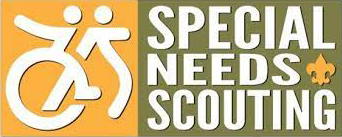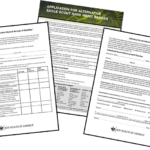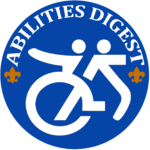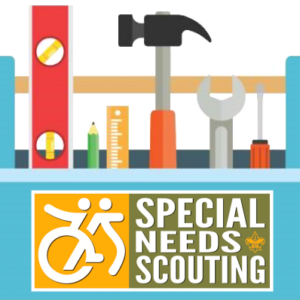Scouts with DisABILITIES and Special Needs
 Scouting helps by giving Scouts with many different abilities an opportunity to prove to themselves and to others that they can do things – and difficult things too – for themselves.” Lord Baden-Powell (Aids to Scoutmastership)
Scouting helps by giving Scouts with many different abilities an opportunity to prove to themselves and to others that they can do things – and difficult things too – for themselves.” Lord Baden-Powell (Aids to Scoutmastership)
Scouting America New Hampshire is committed to making Scouting accessible and enjoyable to all Scouts, regardless of their abilities. Since its founding in 1910, Scouting America has included fully participating members with physical, mental, and emotional disabilities. Scouting America’s policy is to treat all members as equals. It has been traditional, however, to make some accommodations in advancement if absolutely necessary. By adapting the environment and/or our instruction methods, all Scouts, with many different abilities, can find success in Scouting.
The basic premise of Scouting for youth with disabilities is full participation. These Scouts should be treated and respected like every other member of their unit. They want to participate like other youth – and Scouting provides that opportunity.
An individual is considered to have a disability if they:
- has a physical or mental impairment that substantially limits one or more major life activities – seeing, hearing, speaking, walking, breathing, performing manual tasks, learning, caring for oneself, and working,
- has a record of such an impairment, or
- is regarded as having such an impairment.
How to register Scouts with Special Needs
There is no special registration process for Scouts with a disability or special need or procedure to collect such information. If the disability has the potential to cause a scout to not complete ranks before they turn 18, then please see “Registration Beyond the Age of Eligibility” below.
Parents need to discuss with leaders about any accommodations needed. A good unit can and does make simple accommodations for individual members whenever possible. If the youth has mobility or health restrictions that will affect activities, these are generally collected on the Annual Health and Medical Record and kept in case of a medical emergency by the unit leadership or health and safety officer. Leaders and camp staff and event staff don’t share this information with the entire staff, so parents may find it helpful to talk directly to leaders and staff working directly with their children about any accommodations needed or strategies that would be helpful. A parent or Scout leader can contact members of the Historic District Disabilities Awareness Committee for suggestions, resources and valuable perspectives if needed.
Advancement for Members with Special Needs
 Youth with physical disabilities and youth and adults with developmental or cognitive challenges are welcome in Scouting America. As outlined in Section 10 of the Guide to Advancement, various accommodations exist to facilitate advancement. Youth with special needs do not need to join a special unit oriented to serving members with disabilities, although those exist and may be beneficial in some cases. The severity of disability will indicate how members should be registered. When knowledgeable parents, guardians, or volunteers are able to provide assistance and oversight, almost anyone can be a member. While leaders should be enthusiastic about helping those with special needs, they should also recognize the demands that will be placed on their patience, understanding, and skill in working on advancement.
Youth with physical disabilities and youth and adults with developmental or cognitive challenges are welcome in Scouting America. As outlined in Section 10 of the Guide to Advancement, various accommodations exist to facilitate advancement. Youth with special needs do not need to join a special unit oriented to serving members with disabilities, although those exist and may be beneficial in some cases. The severity of disability will indicate how members should be registered. When knowledgeable parents, guardians, or volunteers are able to provide assistance and oversight, almost anyone can be a member. While leaders should be enthusiastic about helping those with special needs, they should also recognize the demands that will be placed on their patience, understanding, and skill in working on advancement.
Advancement Flexibility
 The Guide to Advancement is the official source for administering advancement in helps Scouters understand and implement the advancement programs and procedures of Scouting America: Cub Scouts, Scouts BSA, Venturing and Sea Scouts. See Guide to Advancement: Section 10. Advancement for Members With Special Needs.
The Guide to Advancement is the official source for administering advancement in helps Scouters understand and implement the advancement programs and procedures of Scouting America: Cub Scouts, Scouts BSA, Venturing and Sea Scouts. See Guide to Advancement: Section 10. Advancement for Members With Special Needs.
Scouts who have disabilities may qualify for limited flexibility in advancement. Allowances possible in each program are outlined in the Guide to Advancement. Refer to section 10.2.0.0 in the Guide to Advancement for allowances possible in each program area including Cub Scouts, Scouts BSA, Venturers, and Sea Scouts.
Unit leaders and parents can develop an Individual Scout Advancement Plan (ISAP), No. 512-936 to document proposed and approved alternative advancement requirements.
Application for Alternate Eagle Scout Rank Merit Badges
Though individual requirements for merit badges may not be modified or substituted, youth with special needs may request approval for alternative badges they can complete. Planning ahead is the key. Refer to section 10.2.2.3 of the Guide to Advancement and the Application for Alternative Eagle Scout Rank Merit Badges, No. 512-730.
Registration Beyond the Age of Eligibility
Youth members and adults who are developmentally disabled or cognitively impaired, or youth members with severe physical challenges, may be considered for registration beyond the ages of eligibility: age 11 or older for a Cub Scout, 18 or older for a Scouts BSA member, or 21 or older as a Venturer or Sea Scout. Requests to extend registration beyond the age of eligibility for youth members and adults on the basis of developmental disability or cognitive impairment may be submitted at any time. Requests for youth members on the basis of severe physical challenges must be received before they reach the end of age eligibility for the program. Refer to section 10.1.0.0 of the Guide to Advancement and the Request Registration Beyond the Age of Eligibility, No. 512-935.
Abilities Digest Newsletter
Abilities Digest is a quarterly newsletter about Scouting and special needs designed for Scout leaders, volunteers, and parents. Any Scouting parent, volunteer, or professional may subscribe. Follow Abilities Digest on Facebook.

Resources
 There are many resources available to parents and leaders of Scouts with disabilities and special needs:
There are many resources available to parents and leaders of Scouts with disabilities and special needs:
- Ablescouts.org
- Able Scouts Inclusion Toolbox
- AutismSpeaks.org
- Dyslexiefont.com
- This resource includes fonts that are helpful for those with dyslexia. This can help with learning the Scout Oath, Law, etc.
- Guide to Advancement Section 10: Advancement for Members with Disabilities
- Pica in Children with Autism: A Parent’s Guide
- Scouts with Celiac Disease Presentation
- Special Needs and Disabilities: Serving Scouts with Disabilities
- Scouting for Youth with Disabilities Manual
- Introduction to Working with Scouts with Special Needs Guide
- Newsletter: Abilities Digest
- Facebook Group: No Scout Left Behind
Ideas on Helping Scouts with Disabilities
- Dyslexie
- This resource includes fonts that are helpful for those with dyslexia. This can help with learning the Scout Oath, Law, etc.
- The Scout Law with pictures

© 2026 Boy Scouts of America – All Rights Reserved.
Get in touch